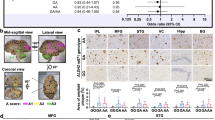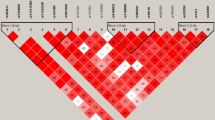Abstract
Since ethanol and its metabolite, acetaldehyde, are directly neurotoxic, alcohol intake could affect the development of Alzheimer’s disease (AD). Mitochondrial aldehyde dehydrogenase 2 (ALDH2) metabolizes acetaldehyde into acetate and also protects against oxidative stress, playing an important role in the development of AD. The activity of dopamine β hydroxylase (DBH) is reduced in the hippocampus and neocortex in the AD brain. DBH is also involved in the pathophysiology of alcoholism. The aim of this study was to investigate whether polymorphisms of both ALDH2 and DBH genes were associated with AD. ALDH2*2 and two functional single nucleotide polymorphisms (SNPs) of the DBH gene were analyzed using a case–control study design. Our case–control data set consisted of 201 AD patients and 130 age-matched controls. We also analyzed stratifying by alcohol consumption and apolipoprotein E (APOE) genotypes. There were no associations between the SNPs studied here and the onset of AD. No synergetic associations were found among the SNPs, APOE and the risk for AD. Although high alcohol consumption AD (HAC-AD) patients were analyzed in detail, the current three SNPs were not related with HAC-AD. ALDH2*2 and functional SNPs of the DBH gene did not modify the risk for AD. Since our data set was constructed only with AD in a Japanese population, further detailed genetic analyses with other ethnic groups would be needed.
Similar content being viewed by others
References
Combarros O, Warden DR, Hammond N, Cortina-Borja M, Belbin O, Lehmann MG, Wilcock GK, Brown K, Kehoe PG, Barber R, Coto E, Alvarez V, Deloukas P, Gwilliam R, Heun R, Kolsch H, Mateo I, Oulhaj A, Arias-Vasquez A, Schuur M, Aulchenko YS, Ikram MA, Breteler MM, van Duijn CM, Morgan K, Smith AD, Lehmann DJ (2010) The dopamine beta-hydroxylase −1021C/T polymorphism is associated with the risk of Alzheimer’s disease in the Epistasis project. BMC Med Genet 11:162. doi:10.1186/1471-2350-11-162
Cross AJ, Crow TJ, Perry EK, Perry RH, Blessed G, Tomlinson BE (1981) Reduced dopamine-beta-hydroxylase activity in Alzheimer’s disease. Br Med J (Clin Res Ed) 282(6258):93–94
Freire MT, Hutz MH, Bau CH (2005) The DBH −1021 C/T polymorphism is not associated with alcoholism but possibly with patients’ exposure to life events. J Neural Transm 112(9):1269–1274. doi:10.1007/s00702-005-0339-8
Hao PP, Chen YG, Wang JL, Wang XL, Zhang Y (2011) Meta-analysis of aldehyde dehydrogenase 2 gene polymorphism and Alzheimer’s disease in East Asians. Can J Neurol Sci 38(3):500–506
Heneka MT, Galea E, Gavriluyk V, Dumitrescu-Ozimek L, Daeschner J, O’Banion MK, Weinberg G, Klockgether T, Feinstein DL (2002) Noradrenergic depletion potentiates beta-amyloid-induced cortical inflammation: implications for Alzheimer’s disease. J Neurosci 22(7):2434–2442. doi:20026222
Kamino K, Nagasaka K, Imagawa M, Yamamoto H, Yoneda H, Ueki A, Kitamura S, Namekata K, Miki T, Ohta S (2000) Deficiency in mitochondrial aldehyde dehydrogenase increases the risk for late-onset Alzheimer’s disease in the Japanese population. Biochem Biophys Res Commun 273(1):192–196. doi:10.1006/bbrc 2000.2923
Kim JM, Stewart R, Shin IS, Jung JS, Yoon JS (2004) Assessment of association between mitochondrial aldehyde dehydrogenase polymorphism and Alzheimer’s disease in an older Korean population. Neurobiol Aging 25(3):295–301. doi:10.1016/S0197-4580(03)00114-3
Kohnke MD, Zabetian CP, Anderson GM, Kolb W, Gaertner I, Buchkremer G, Vonthein R, Schick S, Lutz U, Kohnke AM, Cubells JF (2002) A genotype-controlled analysis of plasma dopamine beta-hydroxylase in healthy and alcoholic subjects: evidence for alcohol-related differences in noradrenergic function. Biol Psychiatry 52(12):1151–1158
Kohnke MD, Kolb W, Kohnke AM, Lutz U, Schick S, Batra A (2006) DBH*444G/A polymorphism of the dopamine-beta-hydroxylase gene is associated with alcoholism but not with severe alcohol withdrawal symptoms. J Neural Transm 113(7):869–876. doi:10.1007/s00702-005-0365-6
Lehmann DJ, Refsum H, Warden DR, Medway C, Wilcock GK, Smith AD (2011) The vitamin D receptor gene is associated with Alzheimer’s disease. Neurosci Lett 504(2):79–82. doi:10.1016/j.neulet.2011.08.057
Lyness SA, Zarow C, Chui HC (2003) Neuron loss in key cholinergic and aminergic nuclei in Alzheimer disease: a meta-analysis. Neurobiol Aging 24(1):1–23
Markesbery WR (1999) The role of oxidative stress in Alzheimer disease. Arch Neurol 56(12):1449–1452
Mukamal KJ, Longstreth WT Jr, Mittleman MA, Crum RM, Siscovick DS (2001) Alcohol consumption and subclinical findings on magnetic resonance imaging of the brain in older adults: the cardiovascular health study. Stroke 32(9):1939–1946
Ohta S, Ohsawa I (2006) Dysfunction of mitochondria and oxidative stress in the pathogenesis of Alzheimer’s disease: on defects in the cytochrome c oxidase complex and aldehyde detoxification. J Alzheimers Dis 9(2):155–166
Ohta S, Ohsawa I, Kamino K, Ando F, Shimokata H (2004) Mitochondrial ALDH2 deficiency as an oxidative stress. Ann NY Acad Sci 1011:36–44
Ruitenberg A, van Swieten JC, Witteman JC, Mehta KM, van Duijn CM, Hofman A, Breteler MM (2002) Alcohol consumption and risk of dementia: the Rotterdam Study. Lancet 359(9303):281–286. doi:10.1016/S0140-6736(02)07493-7
Sara SJ (2009) The locus coeruleus and noradrenergic modulation of cognition. Nat Rev Neurosci 10(3):211–223. doi:10.1038/nrn2573
Wang B, Wang J, Zhou S, Tan S, He X, Yang Z, Xie YC, Li S, Zheng C, Ma X (2008) The association of mitochondrial aldehyde dehydrogenase gene (ALDH2) polymorphism with susceptibility to late-onset Alzheimer’s disease in Chinese. J Neurol Sci 268(1–2):172–175. doi:10.1016/j.jns.2007.12.006
Wenham PR, Price WH, Blandell G (1991) Apolipoprotein E genotyping by one-stage PCR. Lancet 337(8750):1158–1159
Zabetian CP, Anderson GM, Buxbaum SG, Elston RC, Ichinose H, Nagatsu T, Kim KS, Kim CH, Malison RT, Gelernter J, Cubells JF (2001) A quantitative-trait analysis of human plasma-dopamine beta-hydroxylase activity: evidence for a major functional polymorphism at the DBH locus. Am J Hum Genet 68(2):515–522. doi:10.1086/318198
Acknowledgments
This study was partially supported by the High Technology Research Center Grant from the Ministry of Education, Culture, Sports, Science and Technology of Japan and Sportology Center, Juntendo University Graduate School of Medicine. We are grateful for the technical assistance of Ms. K. Yamamoto.
Conflict of interest
We have no potential conflicts.
Author information
Authors and Affiliations
Corresponding author
Additional information
M. Komatsu and N. Shibata contributed eaqually to this work.
Rights and permissions
About this article
Cite this article
Komatsu, M., Shibata, N., Ohnuma, T. et al. Polymorphisms in the aldehyde dehydrogenase 2 and dopamine β hydroxylase genes are not associated with Alzheimer’s disease. J Neural Transm 121, 427–432 (2014). https://doi.org/10.1007/s00702-013-1112-z
Received:
Accepted:
Published:
Issue Date:
DOI: https://doi.org/10.1007/s00702-013-1112-z




